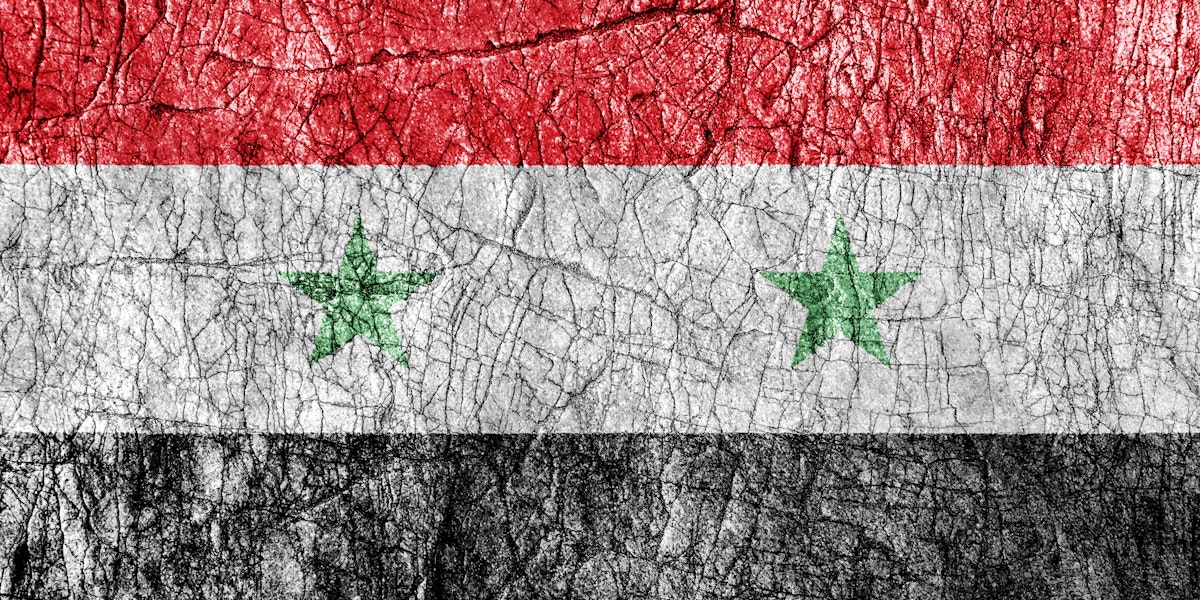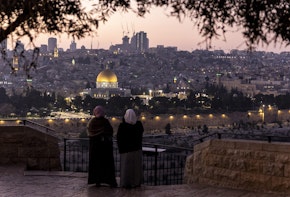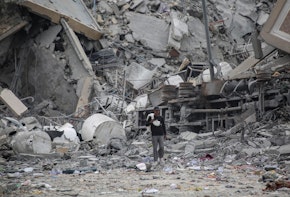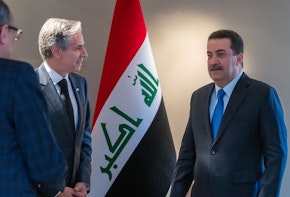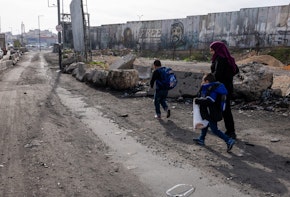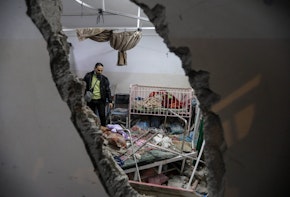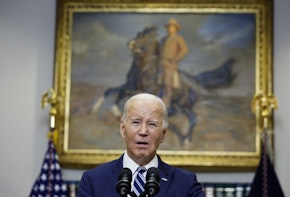The Century Foundation (TCF) has closely followed the conflict in Syria over the last year as its impact has resonated not only in the Levant but as far afield as the White House, Kremlin, and Europe. Contributors Aron Lund and Sam Heller joined TCF fellows Thanassis Cambanis and Michael Hanna to discuss the latest developments in Syria and prospects for the future. Their conversation is below.
Introduction
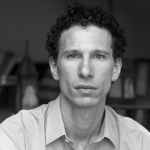 Thanassis: Thanks for joining to talk about some of the pressing or under-addressed aspects of the war in Syria. Attention to Syria has surged of late, especially in some of the foreign capitals whose machinations have so much impact on the Syrian war. A lot of important actors seem to be in a mood to reassess their policies or revise their expectations. Russia, Iran, and Hezbollah seem to be as committed as ever to President Bashar al-Assad, but there are indications that Russia at least, and maybe Iran and Hezbollah, are recalculating what they expect to get in return from Assad. Turkey is in the midst of a foreign policy shift, but we don’t know yet what that means for Turkish support for the Syrian opposition. Saudi Arabia’s frustration is growing, and it has suggested deploying ground troops to help the opposition. Meanwhile, as the United States prepares for life after President Obama, there’s a renewed debate over whether Washington’s policy in Syria has been a failure and over what it can and should do instead.
Thanassis: Thanks for joining to talk about some of the pressing or under-addressed aspects of the war in Syria. Attention to Syria has surged of late, especially in some of the foreign capitals whose machinations have so much impact on the Syrian war. A lot of important actors seem to be in a mood to reassess their policies or revise their expectations. Russia, Iran, and Hezbollah seem to be as committed as ever to President Bashar al-Assad, but there are indications that Russia at least, and maybe Iran and Hezbollah, are recalculating what they expect to get in return from Assad. Turkey is in the midst of a foreign policy shift, but we don’t know yet what that means for Turkish support for the Syrian opposition. Saudi Arabia’s frustration is growing, and it has suggested deploying ground troops to help the opposition. Meanwhile, as the United States prepares for life after President Obama, there’s a renewed debate over whether Washington’s policy in Syria has been a failure and over what it can and should do instead.
Aron, Sam, and Michael, you have paid close attention throughout the last five years to the turns of the screw in Damascus, in opposition areas, in the land controlled by Islamic State (IS, also known as ISIS), and in the vast and ranging Diaspora and shifting coalition of foreign powers that is fighting—sometimes directly, sometimes through proxies—in and around Syria. At this stage in this sad war, is it possible to shift the trajectory at all? Is Syria irreparably fragmented into a mosaic of little fiefs, its long run as a unitary state consigned to history? Is it governable? Aron, you wrote recently about the destruction in Idlib province of a network of informers and enforcers that two generations of Assads crafted over decades. I read your argument to say that the basis for local power and control was always more complex than mere brutality or sectarian loyalty—and that the war has destroyed the architecture of local control not just for Assad but for anyone who wants to govern. Do you think Humpty Dumpty can be put back together again?
A Failing State
 Aron: I don’t have a lot of hope for Humpty Dumpty. It doesn’t look like any party to the war could seize and rule all of Syria again, unless there’s a really dramatic escalation of foreign involvement from one side but not the other. That’s unlikely, of course.
Aron: I don’t have a lot of hope for Humpty Dumpty. It doesn’t look like any party to the war could seize and rule all of Syria again, unless there’s a really dramatic escalation of foreign involvement from one side but not the other. That’s unlikely, of course.
Of the alternatives on offer, Assad is by far the best placed to claw back control, but that’s partly because his rivals have set the bar so low. He has used up most of the economic and human capital he had, his army is increasingly in thrall to sectarian forces, and most Syrians outside government control seem to hate him. It would be difficult for him to control even the half of Syria he holds now if support from Russia and Iran were to taper off while rebels were still active. With continued support, it’s quite plausible that Assad will take back key territory around Damascus and Aleppo and establish himself as the dominant actor in a fragmented Syria. That’s a long way from physically controlling the whole country as he did before 2011, but it is a role that none of his rivals could realistically aspire to.
The war hasn’t downgraded the opposition’s ability to govern, because it never had any such ability. A few anti-government groups have shown real skill as state-builders, but they are all prevented from developing fully by their own narrow base or by foreign enemies.
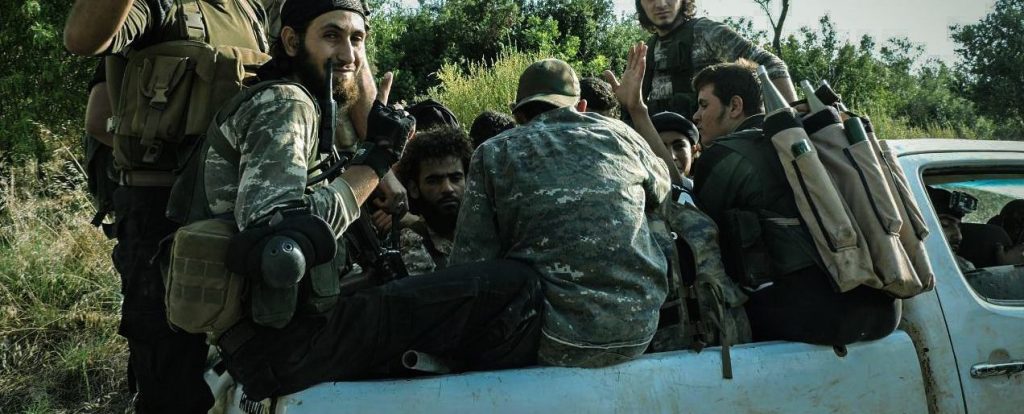
It’s a short list. You have the Islamic State’s so-called caliphate in the east and northeast, there’s the socialist Rojava autonomy set up by Kurdish groups aligned with the Kurdistan Workers’ Party (PKK) along the Turkish border, and there’s a web of sub-state governance bodies in the Idlib region run by al-Qaeda’s Nusra Front. All three are being undermined by outside governments bombing them or inciting Syrian factions against them. The two big Islamist factions known as Ahrar al-Sham and the Islam Army have also shown some ability to organize people and territory, but most of the wider insurgency is made up of local groups that refuse to unite with their next-door neighbors. They hold out no promise of centralized statehood at all.
Growing Fragmentation
 Sam: Not to sound too same-y, but I think I agree with most of Aron’s points.
Sam: Not to sound too same-y, but I think I agree with most of Aron’s points.
No non-state faction in Syria has demonstrated the ability to build a state-like apparatus that a) functions in more than a rudimentary capacity and b) does not have some foreign or local power absolutely committed to destroying it.
The Assad regime is and will likely remain the only recognizable “state” in Syria. In that sense, I understand why both the United States and Russia apparently want to engineer a political transition that maintains some continuity in the Syrian state’s functioning and its existing institutions, even if they disagree on the “how” of that transition. If the Syrian state were to suddenly break apart, I see no reason to believe that the United States and others could successfully reconstitute it.
Yet I also think it makes sense to be real about what the Syrian state is and why that likely limits its ability to recapture much of the country. The Syrian state is not a neutral services administration from which you can neatly amputate the security branches and other bodies that many Syrians loathe. The relevant organs of the Syrian state are, to my knowledge, the Assad regime, its related network of personal and familial relationships, and the state’s terrifying coercive apparatus.
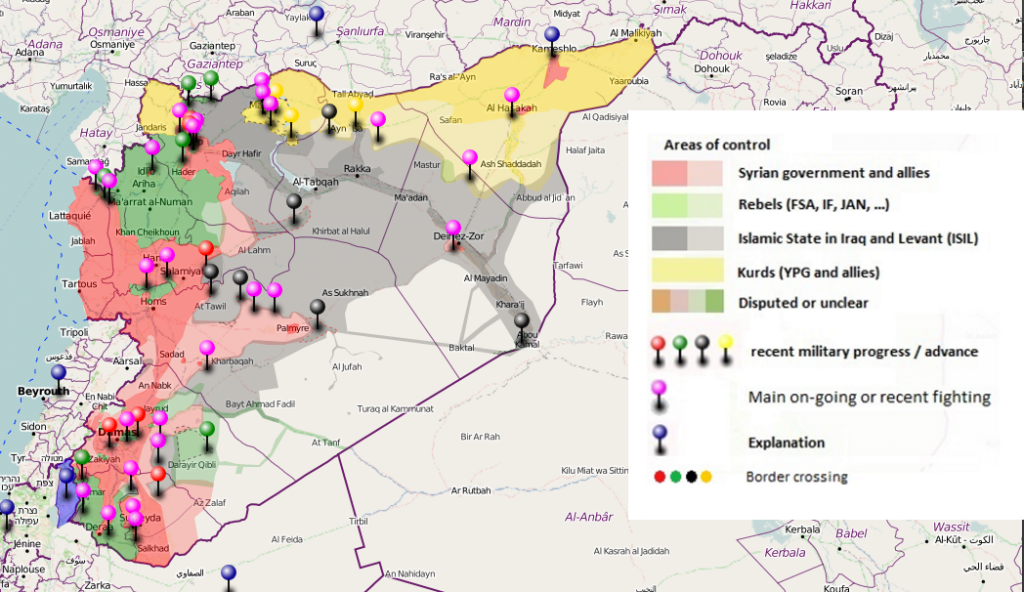
Most Syrians in areas that have fallen outside Syrian state control, I think, view the restoration of control by the regime and its security services as anathema. They will fight to hold off the regime or, if necessary, flee. Some of these areas, including stubborn opposition pockets along the country’s western spine, can be starved or brutalized into surrender. Yet even those parts of the country are likely to remain permanently restive—technically returned to “the nation’s bosom” but dangerous and unwelcoming for representatives of the state and likely wellsprings for future unrest. I am skeptical that the regime will ever muster the capacity or will to fully recapture other large sections of the country, including the east.
And even in areas of safe regime control, I’m personally unclear on how the regime will deal with the formidable economic and demographic pressures the war has imposed on it, whatever open-handed support it receives from its foreign sponsors.
All of this means, I think, that we’re unlikely to see the return of any single Syrian state. Yet we also have a set of belligerents—on all sides except, seemingly, the Kurds—who will refuse to formally cede their claim to any part of the country. If I had to bet, I would anticipate more disintegration and war.
Strategic Stalemate
 Michael: On this theme, I would first note that despite the incremental but continuous escalations of the past five plus years, the war remains strategically stalemated in the sense that no one side has been or will be able to achieve outright military victory. There have been periods in which the tactical successes of either side have threatened to shift that stalemate, but it has been precisely those moments of weakness and vulnerability that have continually spurred further commitments of outside support.
Michael: On this theme, I would first note that despite the incremental but continuous escalations of the past five plus years, the war remains strategically stalemated in the sense that no one side has been or will be able to achieve outright military victory. There have been periods in which the tactical successes of either side have threatened to shift that stalemate, but it has been precisely those moments of weakness and vulnerability that have continually spurred further commitments of outside support.
This is clearly demonstrated by the sequence of events following the success of Jaish el-Fatah in the spring and summer of 2015, which culminated with the eventual entry of Russia into the conflict in direct fashion. All that is to say that none of the outside sponsors to the conflict are willing to allow their allies and proxies to be defeated.
Clearly, the manpower and capacity shortages that have hampered the Assad regime throughout the war are not going to simply be overcome by the support of outside powers.
That being said, it is remarkable to clearly see the limits of how far outside intervention can go in supporting the Assad regime’s war effort. And, of course, intervention and support of the regime can be undertaken in much more straightforward fashion than is the case with the rebels. The regime and its allies have made significant territorial gains, but the military picture remains mixed. More importantly, it remains mixed despite major Russian escalation in terms of its direct involvement and massive external support from Iran and Hezbollah. Clearly, the manpower and capacity shortages that have hampered the Assad regime throughout the war are not going to simply be overcome by the support of outside powers.
This reality has also likely impacted how Russia views the conflict and their role in it. From a U.S. perspective, it is interesting to see Russia frustrated by the inability of the Assad regime and its armed forces to decisively seize upon their unprecedented levels of support. To date, though, Russia has calibrated its military involvement and how it chooses to deploy its forces has a major impact on the Assad regime’s capacity and planning. Based on their consistent signalling, however, there is no reason to believe that Russia is interested in the kinds of investment that would be necessary to support an eventual reconquest of all Syrian territory.
So it seems inevitable that the de facto fragmentation of the country will continue alongside the war. This is quite distinct from any kind of formal partition of Syria. It’s notable, as Sam pointed out, that apart from ISIS and, in a longer time-frame, Jabhat el-Nusra, there is no real constituency for secession or revisionism with respect to the borders of the country. Coupled with the regional and international rejection of a major redrawing of territorial divisions and the fact that the political economy of Syria has been transformed, Syria is likely to devolve into linked spheres of influence with regional players continuing to play the part of benefactors, sponsors, and arbiters.
A Successor for Assad?
 Thanassi: That’s one of the depressing conclusions I encounter every time I try to imagine a better scenario. What reason is there to think that intervening powers who consistently make a hash of things—like the United States in Iraq, or Russia in the Ukraine, or Iran in the Levant, for that matter—will suddenly discover great talent and precision management in Syria, after five years of war? The intervening powers all have long track records none of which inspire confidence in their Machiavellian talents, and that’s before even considering their agendas.
Thanassi: That’s one of the depressing conclusions I encounter every time I try to imagine a better scenario. What reason is there to think that intervening powers who consistently make a hash of things—like the United States in Iraq, or Russia in the Ukraine, or Iran in the Levant, for that matter—will suddenly discover great talent and precision management in Syria, after five years of war? The intervening powers all have long track records none of which inspire confidence in their Machiavellian talents, and that’s before even considering their agendas.
To boot, there’s little hope for a future unified Syria under some better strong leader. Who could replace Assad? Some people bandy around names of weak Alawite figure like the retired defense minister as possible alternatives. Conventional wisdom holds that all the internal candidates to replace Assad died in one single bomb attack on the ministry of defense in Damascus in 2012, and that Assad himself reaped the biggest windfall of that group assassination.
In any event, it is difficult to conceive a viable nationalist leader who would be strong enough to control Syria, palatable enough to win opposition support, and somehow credible enough to old regime figures that constituencies like the Alawites and pro-Assad Sunnis would feel safe from reprisal. Some supporters of the uprisings have halfheartedly raised the possibility of Ali Mamluk, the hated intelligence chief who has loyally served Assad but is a Sunni. His sect might endear him to Sunni oppositionists, while his credentials as a security boss and Assad henchman would win him the trust of government supporters. I find the scenario far-fetched—but then again, look at the previous job of Egypt’s current strongman-dictator. Gaming out the future seems to foreclose options for the present. The opposition doesn’t even have a single leader, although Nusra and the Islamic State both do. More and more I see Iraq and Lebanon, with their failed central states and plethora of bosses and warlords and subcommunities, as a depressing template for Syria’s future.
Weak Vice Presidents
 Aron: The succession issue is interesting. It is a crucial issue both for those who seek to keep the regime in power and to those who want to get rid of Assad through some form of transition.
Aron: The succession issue is interesting. It is a crucial issue both for those who seek to keep the regime in power and to those who want to get rid of Assad through some form of transition.
The Syrian regime really is a black box, it’s always been that way. Don’t believe opposition members and analysts who say it’s this way or that. There’s an abundance of cocksure speculation, but hardly anyone can even tell you names of the advisers, secretaries, and generals on whom Assad relies in his daily work—much less what they think, say, or plan to do. The president himself seems to be the only person with really good oversight. Russians and Iranians must have more inside knowledge than most outsiders, but they, too, are probably in the dark about a great many things.
My best guess, which is, in other words, not necessarily a good guess, is that there’s no one at this point who could just step in and replace Assad without risking political chaos and/or his own life. It’s called “the Assad regime” for a reason: the elite is cluttered with members of the Assad family and with people linked to them in some fashion. If you’re not going to have an Assad at the top, then the next guy in the presidency is likely to end up as a lame duck, struggling to sneak orders past a veritable wall of Assad cousins, school mates, business partners, and in-laws who control the levers of power just below him.
If Assad suddenly died, there would of course have to be a successor. Constitutionally speaking, the next man would be a woman: Najah al-Attar, the vice president. But she’s been put there for a reason. She’s an 83-year-old former culture minister from a Damascene Sunni family, sister of a former Muslim Brotherhood leader. The chances of her ever operating as commander in chief are lower than zero. Yet that’s who Bashar has made his constitutional successor, in line with the strategy he inherited from his father: you’ll have me or no one. During Bashar al-Assad’s second mandate, 2007-14, there were actually two vice presidents—Attar and Farouq al-Sharaa, a former foreign minister. But as soon as the Arab League began to float Sharaa’s name as a possible transition leader in 2011-12, he was shown off the stage by Assad. He’s now in retirement, with no public role at all.
There will be no one standing there to catch the Syrian state if it falls from Assad’s hand, that’s the whole idea.
Syria’s Opaque Power Structure
 Thanassi: So it’s a one-man show but it cannot be stopped? Other authoritarians in the region tried to coup-proof themselves with a similar formula: it’s me or chaos. Hosni Mubarak turned out to be replaceable, while Iraq almost collapsed after Saddam Hussein’s defenestration. Is this threat, or strategy, turning out better for Assad?
Thanassi: So it’s a one-man show but it cannot be stopped? Other authoritarians in the region tried to coup-proof themselves with a similar formula: it’s me or chaos. Hosni Mubarak turned out to be replaceable, while Iraq almost collapsed after Saddam Hussein’s defenestration. Is this threat, or strategy, turning out better for Assad?
 Aron: Well, he’s still there, isn’t he? It’s not working out great for Syria, but from the perspective of Assad and his most committed supporters, that’s not their fault—it’s because of the opposition, the Americans, the Muslim Brotherhood, Turkey, and so on.
Aron: Well, he’s still there, isn’t he? It’s not working out great for Syria, but from the perspective of Assad and his most committed supporters, that’s not their fault—it’s because of the opposition, the Americans, the Muslim Brotherhood, Turkey, and so on.
Theoretically you could have a very nice transition in Syria if the machinery of state was managed right and everyone involved cooperated. Maybe that wouldn’t produce a viable regime in the longer run, but who knows—maybe it would. What I doubt is that you could have a stable transition if Assad decides to fight it. In theory, all the pieces could still fall into place. But in practice, it would be a huge gamble for the people who depend on this system for their survival, who would have to organize the actual transition.
How do you create that ripeness for transition inside a very strict, centralized, and paranoid dictatorship in mid-civil war, where even raising the issue with others would be considered high treason?
Even high-ranking Assad supporters are likely in the dark about how the state and army would cope with a political vacuum. That means they’re not likely to take a leap of faith and try to remove Assad in favor of someone more acceptable to the opposition, unless they know and trust that person, know that they have enough people backing him, and are confident that it would work despite violent resistance from Assad and his relatives. How do you create that ripeness for transition inside a very strict, centralized, and paranoid dictatorship in mid-civil war, where even raising the issue with others would be considered high treason?
Of course, Assad may at some point decide to give his personal blessing to a successor and support a transition away from himself. This seems to be the core assumption of U.S. policy. It’s just that in five years, I’ve seen no reason to think so. But neither Bashar al-Assad nor Barack Obama are in the habit of telling me everything they do, so maybe things are being said that I am not aware of?
Finally, what would happen if Bashar al-Assad was forced out of power anyway? I guess that depends on who tries to force him, who they want to replace him, and so on. But in an unplanned succession—let’s say he slipped and fell in the stairs of the People’s Palace—it’s reasonable to assume that there would be internal pandemonium and panic, but also that many regime supporters would flock to the best-known individual at the heart of power. Assad has made sure no one knows who could succeed him, so they’d try to find the safest bet. They would do so to preserve stability, but also to be on the winning team, knowing that others would react in the same way.
The primary choice would almost certainly be the president’s brother Maher al-Assad. Conventional wisdom holds that he is the second-most powerful man in Syria, and perhaps he is. So whether he ever dreamed of to taking over or not, a lot of generals and ministers are likely to throw themselves around his knees and ask him to take charge.
It’s similar to the scenario that played out in 1984, when Hafez al-Assad fell ill and appointed a caretaker committee of high-ranking civilian and military figures. Not coincidentally, all of them were Sunni Muslims connected to him personally, instead of to his brother or other inner sanctum strongmen: it was Tlass, Ahmar, Khaddam, Masharqa, Shehabi, and Kasm. It then took about ten seconds for some of the most powerful Alawite generals to panic and start making phone calls to the second-most powerful man in Syria, the president’s brother Refaat al-Assad, who happily accepted their show of support and began to usurp the powers of the committee. This began to snowball really fast toward a coup d’état, when Hafez finally rose from his sick bed and mobilized his troops to face Refaat’s men in the streets of Damascus. At that point, many of his lieutenants rushed back to his side, with a sigh of relief, because they were finally certain who called the shots in Syria. So Refaat ended up outgunned and abandoned, and Hafez sent him packing on a diplomatic mission to Moscow, which turned into lifelong exile. And that was the end of that.
Many things have changed since then. But if you try to force a transition in Syria today, without the president’s acquiescence, proper preparations, and a critical mass of support within the system, you’ll almost certainly have the same results: a frantic search for the strongest of the strongmen, and a drift toward infighting.
Someone like Mamlouk, who is indeed a very powerful figure—but for many reasons, I think, neither side’s preferred choice for president—would probably be elbowing his fellow generals to get first in line to Maher and deflect any suspicions of disloyalty.
But of course, no one knows. It’s like Schrödinger’s cat: you can’t know if the transition option is dead or alive until you rip the lid off the regime and look inside, but at that point it will be too late to change your mind.
A Regime that Just Won’t Quit
 Sam: On the nature of the Assad regime and, in a broader sense, the horizons for U.S. policy on Syria, I don’t think it behooves the United States—or, really, anyone—to base policy on a set of illusions about the relevant actors on the ground.
Sam: On the nature of the Assad regime and, in a broader sense, the horizons for U.S. policy on Syria, I don’t think it behooves the United States—or, really, anyone—to base policy on a set of illusions about the relevant actors on the ground.
For all the reasons Aron enumerated, the regime seems exceedingly unlikely—under any degree of pressure, direct or indirect—to negotiate its own decapitation and the potential disintegration of the Syrian state. There are a lot of reasons why the United States’ current push for a negotiated political settlement is unlikely to succeed, but the regime’s (understandable) intransigence has to be the main one.
But this is the regime we have and around which we have to plan any policy course. Likewise, we have to reckon with the regime’s competitors for power as they are, not as we’d like them to be.
The armed opposition is the United States’ main vector for influencing the Syrian conflict and, in theory, tipping the military balance in a way that could facilitate a parallel political process. But I don’t think we should overstate the coherence and malleability of the armed opposition on the ground, and I don’t think America has the capacity to re-engineer the character of the opposition to suit Washington’s objectives.
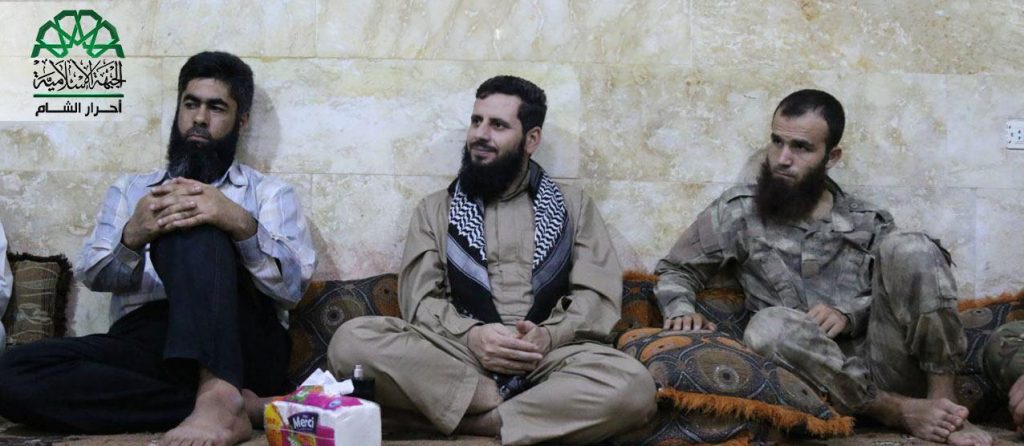
The northwest is now the vital center of the armed opposition, particularly after the effective neutralization of most opposition-areas in Syria’s center and south. But if we’re being straight, Jabhat al-Nusra and Ahrar al-Sham have a sort of split hegemony over Idlib and most surrounding areas, including a veto over traffic across the Turkish border. Jabhat al-Nusra in particular is not a static target. It is conscious of Western attempts—both real and imagined—to turn smaller nationalist factions against it. Jabhat al-Nusra is on the ground and within arm’s length of any factions the United States may back from a distance, and Nusra will (figuratively) decapitate any factions it thinks America may be grooming as competitors, just as it did with Hama’s Jeish al-Tahrir this month.
In this and other respects, I think that America’s ability to shape the Syrian war, by a military escalation or by other means, are limited. For the United States—and certainly for Syrians themselves—there is a tremendous cost to continued war. But I don’t think it necessarily follows from that fact that America has a lot of means on hand to avoid or even mitigate that cost.
Dilemmas of Escalation
 Michael: So Sam rightly notes some of the limitations for U.S. policy and I’ll expand on some of these very acute dilemmas, particularly as they relate to deepening military involvement and further escalation.
Michael: So Sam rightly notes some of the limitations for U.S. policy and I’ll expand on some of these very acute dilemmas, particularly as they relate to deepening military involvement and further escalation.
Several years back there was a lively discussion and debate within the Obama administration about the Assad regime’s calculus and whether greater military pressure could shift the regime’s view of the conflict and a potential political process and eventual transition/settlement. Proponents of the “escalate to de-escalate” approach believed that this was the only way to force the Assad regime into serious negotiations. At the time, I was willing to consider these arguments and thought then that incremental escalation might create more favorable conditions for a political track.
Unfortunately, the trajectory of the conflict over the past two-plus years suggests that escalation has only begotten further escalation, and in the midst of this escalatory cycle, the calculus of the Assad regime has remained constant: it sees the conflict in existential terms and is only willing to prosecute its fight through military means. Its approach to the war lacks any effort at conciliation through politics. Up until the short-lived cessation of hostilities, the furthest the regime was willing to go was to accept rebel surrender in certain instances or to observe undeclared but unstable ceasefires. In sum, I agree with Sam that the regime is absolutely uninterested and unwilling to negotiate its own demise. There is simply not going to be a negotiated political transition as we understand that term.
Whether Russia is being entirely cynical when it suggests that it is not tied to the Assad regime but is unwilling to consider pushing for the removal of Assad in the context of the current iteration of negotiations, it is abundantly clear by now that Russia is not going to push for Assad’s ouster at a time when it sees the regime as substantially degraded and the risks of collapse as very real. As I just mentioned, it’s also possible that those ideal circumstances floated by Russia are simply a cynical effort to forestall any substantive political reform in Syria. In either case, the prospects for negotiation now are non-existent.
As important, Russia’s direct entrance into the war very clearly suggests that the end result of any further escalation would be further escalation. And here I do agree with some administration officials who have argued that in the context of Syria, Russia has escalation dominance. Russia’s punishing escalation on Turkish proxies and allies following the November 2015 Turkish shooting down of a Russian fighter jet should produce some caution when thinking through potential escalatory options.
This is particularly the case when it comes to the direct use of U.S. air power against the Assad regime, which would likely lack legal basis in any event. More crucially, though, in light of Russia’s own military engagement and its deployment of substantial air defense systems and personnel in Syria, the prospects for inadvertent U.S.-Russia escalation are quite serious and present an unconscionable risk. And that doesn’t even begin to consider how the United States would approach the suppression of Syrian and Russian air defense systems in regime territory. When critics breezily discuss deploying U.S. air power against Assad, I have a hard time understanding what interests are at stake that could justify such a risk.
Last point on this issue of direct U.S. military action: the limited use of American air power would not definitively tip the military balance and would inevitably create a problematic credibility trap in which the logical next step following the inconclusive results of airstrikes is further escalation. At the risk of being repetitive, I think the risks here are wholly unjustifiable.
Now that leaves the issue of escalation through the use of military proxies, but in the interest of not rattling on incessantly, I’ll discuss the issues of rebel effectiveness and Nusra inter-linkage in the next round.
Options in the Gray Area
 Aron: If I can butt in with a comment on this very interesting argument, Michael, I think you’re right to list these difficulties. I try not to take either side in these discussions, and there are certainly smart people on all sides of the intervention debate, but it’s great to see this kind of nuanced reasoning and an insistence on thinking a few moves ahead, instead of just reflexive support or opposition for a bigger U.S. role. However one feels about increased U.S. involvement in Syria, the obstacles you list are real and should be part of the equation.
Aron: If I can butt in with a comment on this very interesting argument, Michael, I think you’re right to list these difficulties. I try not to take either side in these discussions, and there are certainly smart people on all sides of the intervention debate, but it’s great to see this kind of nuanced reasoning and an insistence on thinking a few moves ahead, instead of just reflexive support or opposition for a bigger U.S. role. However one feels about increased U.S. involvement in Syria, the obstacles you list are real and should be part of the equation.
But in fairness to the interventionist side of the debate, I would like to note that the ideas being floated now—including by people close to your de facto president-elect, Hillary Clinton—mostly do not involve the use of manned jets against regime targets. Their suggestions tend to focus on the use of stand-off weapons, like cruise missiles. The idea would be to launch punitive strikes from afar, without having to confront or shut down Syrian air defenses, much less Russian air defenses. I know you are aware of this, but I think it’s useful to focus for a moment on that argument, because it is a meaningful evolution of the case for intervention.
Now, in so far as this would be a strategy to force a transition, I still don’t think it’s a credible one. We do not even have to discuss the counter-escalation issues or whether Assad could theoretically be coerced into leaving office alive. The transition argument runs aground on a much simpler point. It is not a question of what limits Moscow can impose on a hypothetical U.S. air war, it is about what limits Washington has already imposed on itself.
It is not a question of what limits Moscow can impose on a hypothetical U.S. air war, it is about what limits Washington has already imposed on itself.
To the best of my understanding, no one influential in Washington genuinely wants to pressure the Syrian regime hard enough for it to break and lose cohesion or be run out of the major cities. The United States was not prepared to bring down Assad militarily in 2011, 2012, or 2013, and it is even less interested after 2014, when it shifted its focus away from Assad toward the Islamic State. This calculus has applied to Obama and it will apply to Clinton, who already takes care to note that her no-fly zones would not be intended to bring down the regime, just to protect refugees. It’s more forward-leaning, but only up to a point.
Yet, if you truly want the regime to feel that defeat is inevitable, you can’t just fire off a few missiles, block airstrikes in a border region, and give the rebels a dozen extra villages in Deraa. Assad would laugh it off. To make him and his generals change their calculus, if at all possible, you need to start breaking the pillars they stand on—or at least prove that you’re prepared to do so. You need start destroying or taking away the major cities, kill lots of soldiers, drive the economy to implosion, and expose pro-regime civilians to terror and death. That’s what war is.
For a number of reasons, including domestic ones, the United States doesn’t want to do that. Neither this president nor the next one will be prepared to let the rebels shoot their way into Hama, Aleppo, or Damascus. They do not want to have to manage the fallout of that, in terms of humanitarian suffering, institutional destruction, and political blowback. That means that the intervene-for-transition strategy just does not compute. The White House will continue to make loud threats and it will continue to nudge Assad against the abyss, balancing forces and toying with rebel configurations, but it will not apply enough force to actually destroy the regime. And it is obvious to all parties involved. It is a game of chicken in which the United States has been flashing its blinkers from a mile away. Assad sees it. Putin sees it. Khamenei sees it. The only major actor that hasn’t adjusted its Syria policy to American preferences is the United States itself.
A Meltdown with Wide Implications
 Thanassi: Two separate and crucial arguments are percolating here. The first how crucial are the interests at stake in Syria—to the United States as well as to other players, especially U.S. allies. The second is—if you come down as I do on the side that the United States actually does have a core national security interest in stabilizing Syria—does Washington actually have the ability to do anything about it? The serious debate is really over a small part of the spectrum. Michael isn’t arguing that Syria’s collapse doesn’t matter; he’s arguing that it doesn’t matter enough to justify a risky U.S. escalation. And while Michael and I disagree on how to rank Syria’s collapse as a national security interest and priority and on how much effort the United States should make to shape and manage the conflict, we both agree that America has very limited means to steer events on the ground even when it wants to.
Thanassi: Two separate and crucial arguments are percolating here. The first how crucial are the interests at stake in Syria—to the United States as well as to other players, especially U.S. allies. The second is—if you come down as I do on the side that the United States actually does have a core national security interest in stabilizing Syria—does Washington actually have the ability to do anything about it? The serious debate is really over a small part of the spectrum. Michael isn’t arguing that Syria’s collapse doesn’t matter; he’s arguing that it doesn’t matter enough to justify a risky U.S. escalation. And while Michael and I disagree on how to rank Syria’s collapse as a national security interest and priority and on how much effort the United States should make to shape and manage the conflict, we both agree that America has very limited means to steer events on the ground even when it wants to.
Time will tell how broadly the fragmentation first of Iraq and now of Syria will echo. I believe that we can tie many insalubrious developments to the meltdown in Syria and Iraq, which have functioned as a long, morphing war now in its fourteenth year: Turkey’s authoritarian turn, the authoritarian relapse that followed the Arab uprisings, Europe’s crisis over refugees and EU integration, the rise of isolationists, nativists and the anti-Muslim and anti-immigrant far-right. But even if you agree with my diagnosis, which I know not all of you do, it doesn’t lead to a clear prescription for what the United States should do, or even, what it can do. I think that the United States simply has to do more, because the consequences of Syria’s war are catastrophic, and because Assad’s government, with support from Russia and Iran, is already well into a project of destroying the infrastructure, institutions, and population of Syria so that, even if the United States does nothing or acts with great restraint, the result will be toxic instability and a broken Syria. An honest argument for escalation has to come with low expectations, and take into account the risks—just as an argument for the status quo, or for greater restraint that effectively tilts the scales in Assad’s favor, must come similarly garbed in heavy caveats.
Does Russia Have “Escalation Dominance”?
 Aron: Well, there’s no doubt that Syria matters to the United States. What is or isn’t a core interest is another matter, but clearly the United States—and a lot of other nations—will continue to take an interest in this war and try to shape it in different ways.
Aron: Well, there’s no doubt that Syria matters to the United States. What is or isn’t a core interest is another matter, but clearly the United States—and a lot of other nations—will continue to take an interest in this war and try to shape it in different ways.
That brings me to another point, following on to the one I made earlier. Not all pro-intervention arguments are about forcing a transition. Thanassi, you argued in your recent report on Syria that the United States could use punitive strikes to shape the regime’s military behavior, to extract a price for the bombing of civilians or for breaching truces. It would be a kind of interventionist conflict management rather than another grand tilt at the windmills of a negotiated solution.
Wherever one stands on that, it is clearly a much more realistic proposal. It is also one gathering force in the debate, with that dissent memo from the fifty-something American diplomats, as well as proposals from influential people in the Clinton camp. They all argue that a more muscular U.S. role in Syria could facilitate a transition, which, as I said, I find a little spurious. But they also stress that even without transition, the United States should use limited force in order to shape the conflict and curtail human rights abuses, indiscriminate bombing, refugee streams, et cetera. This is an argument that has a lot going for it from a purely humanitarian angle, given how horribly Assad’s air war has affected the civilian population in rebel-held territory. It also seems like a more realistic way of creating American leverage over the Syrian conflict and its Middle Eastern rivals, if that’s what one is looking for.
So, if the United States decides to adopt a more interventionist approach under a Clinton presidency, I can definitely imagine it going down this route.
But this is perhaps where the counter-escalation discussion comes into play. Even if not a single manned aircraft would take part in such strikes, there are a lot of ways in which the opponents of an intervention could respond. Russian S-400s and S-300s could pluck a lot of missiles out of the sky, and U.S. jets flying missions against the Islamic State would also be within their range. Even if Russia does not want to fire at American jets, these advanced missiles could be transferred to Syrian control at the stroke of a pen. Then what? Would the U.S. Air Force respond in kind and start killing the re-flagged Russian missile crews, while pretending that they are Syrians and that that is not a great-power conflict?
In short, Vladimir Putin could make things very complicated for the United States. Even without challenging the U.S. intervention directly, who’s to say he won’t throw a fit and decide to double, triple, or quadruple his air support for Assad? Iran could also easily retaliate against U.S. interests in Iraq and Lebanon.
So the issue of escalation dominance does not go away, even if the United States were somehow able to conduct a 100 percent safe intervention and limit its goals to restraining certain behavior. Maybe the next administration would still think that kind of intervention would be worth trying in order to call Putin’s bluff, change the dynamics of the war, and limit its consequences for civilians and for neighboring states? Or maybe not?
It raises all kinds of important questions about slippery slopes, humanitarian intervention, and proxy conflict, not to mention U.S. and international law. Somewhere in here, there is also a more fundamental and unresolved question about American interests and the global role of the United States. But I’ll let you Americans sort that out.
 Michael: Aron has rightly pointed out additional alternatives for direct U.S. intervention that are presumably less risky than U.S. bombing sorties targeting the Assad regime, but this option is still being discussed in certain quarters as if it remains a practicable policy choice.
Michael: Aron has rightly pointed out additional alternatives for direct U.S. intervention that are presumably less risky than U.S. bombing sorties targeting the Assad regime, but this option is still being discussed in certain quarters as if it remains a practicable policy choice.
I also agree that the issue of escalation dominance remains, even with respect to the use of stand-off weapons. Without further expanding upon those risks, I think Aron has pointed out a fundamental flaw in the logic of escalation. The United States is committed to preserving the institutions of the Syrian state and does not support military-led regime change. The use of force, whether through proxies or otherwise, is intended as incremental coercion to force political outcomes. But we’ve seen that when faced with the very real prospect of regime collapse and failure at previous junctures, that Assad and his allies have simply escalated the conflict further. There just does not appear to be a properly-calibrated increase in force that will produce the managed and negotiated transition that is the stated goal of U.S. policy. At the end of the day, the weaker the Assad regime becomes, the more that Russia will cling to it. Russia’s entire public signalling on this question of transition is predicated on the idea that Syria and its security situation are simply too fragile to countenance any kind of substantive political change, particularly as it pertains to Assad.
Now having said all that, I think it’s worth noting that the thrust of recent U.S. policy isn’t, I don’t think, primarily concerned with the immediate issue of Assad and his fate. Instead, and I agree, the primary goal of U.S. policy in Syria is de-escalation, or at least de-escalation in pockets. That is similarly a very difficult proposition, for political, military, and moral reasons, but it is perhaps a more realistic near-term goal. The ceiling of our expectations should be in the very modest realm of the feasible. And even partial de-escalation will have a much greater impact on civilian protection than any other possible courses of military escalation.
Piecemeal Conflict Management
 Sam: I think de-escalation either at the local or national level would, at this point, be ideal, and much more plausible than some sort of grand bargain that knits the country back together.
Sam: I think de-escalation either at the local or national level would, at this point, be ideal, and much more plausible than some sort of grand bargain that knits the country back together.
And yet: There are variations on de-escalation, and the sort of de-escalation that is now taking place is not necessarily a desirable or tenable model.
Where we’re now seeing de-escalation is southern Syria and in a number of smaller trucial pockets up through Homs. Almost none of these arrangements are based on any sort of parity or reciprocity. They’re the result of encircled rebels who have had the screws put to them, whether those are rebels in small, hungry towns surrounded by the regime; or southerners for whom Jordan can turn off and on all supplies, from bullets to flour. Compelling rebels to sullenly concede to phased surrenders may, on net, spare civilian life, but the ugly politics around them mean I’m not convinced they’re something we want to promote. I’m skeptical that these agreements will promise long-term stability, and I’m not sure you can really make these arrangements any differently so long as the regime is necessarily the counterparty to any deal.
Another lesson I took from the cessation of hostilities and its ultimate breakdown was that, on the various interlocking and concentric regime-opposition fronts nationwide, violence anywhere is a threat to stability everywhere. Much of the opposition, including its nationalist armed factions, is basically local. Yet there is a real unifying consciousness to the opposition nationwide, one that has been forged by the shared experience of the 2011 uprising. There are limits to how long rebels are willing to stand down as they watch the regime concentrate its fire on a single vulnerable area or town elsewhere in the country.
In just one example: It seems like one of the proximate reasons for escalation between the opposition and the regime south of Aleppo in April—which really heralded the end of the cessation of hostilities—was regime bombing of the rural Damascus town of Deir al-Asafir. That’s part of what seems to have convinced non-jihadist rebels who had abided by the cessation that they were obliged to re-engage.

Now we have “de-escalated” southern rebels standing by as the regime’s forces finally consume the nearby Damascus suburb of Dariyya, a genuine symbol of the opposition’s resilience, while members of the opposition elsewhere in the country try to publicly shame the southerners into launching some sort of diversionary action. This is humiliating, and I’m not sure how long it can last before it goes in an unpredictable direction.
That said, I’ve been discussing de-escalation as I think we’re now seeing it. Michael, I know you had thoughts on an alternate paradigm for de-escalation—do you want to go into those?
The Nusra Conundrum
 Michael: Thanks Sam, I do. First though, I want to talk about the complications that you rightly posit will face any effort at de-escalation. And this is a policy choice based on pessimism and despair—and, I think, on the Obama administration’s part, a desire to hand over a more sustainable Syria policy to their successors. It’s essentially an admission of real failure. But these conclusions are based on the fear of even more serious escalation and a lack of any confidence in the ability to cultivate effective proxy fighters on the ground. The United States has in no way been the prime shaper of the war’s military trajectory. In fact, it is absolutely fair to describe American involvement as reactive and hesitant. But that view, which is often linked with criticism of U.S. Syria policy, obscures the fact that the U.S. covert program, alongside that of allied countries, is still quite substantial and the results have been underwhelming. It is simply very difficult to create effective and reliable proxy forces in these kinds of conflicts. It’s not simply U.S. incompetence or fecklessness that render these efforts less than satisfactory. And any effort to intensify support to rebels is going to be bedeviled by the Nusra conundrum.
Michael: Thanks Sam, I do. First though, I want to talk about the complications that you rightly posit will face any effort at de-escalation. And this is a policy choice based on pessimism and despair—and, I think, on the Obama administration’s part, a desire to hand over a more sustainable Syria policy to their successors. It’s essentially an admission of real failure. But these conclusions are based on the fear of even more serious escalation and a lack of any confidence in the ability to cultivate effective proxy fighters on the ground. The United States has in no way been the prime shaper of the war’s military trajectory. In fact, it is absolutely fair to describe American involvement as reactive and hesitant. But that view, which is often linked with criticism of U.S. Syria policy, obscures the fact that the U.S. covert program, alongside that of allied countries, is still quite substantial and the results have been underwhelming. It is simply very difficult to create effective and reliable proxy forces in these kinds of conflicts. It’s not simply U.S. incompetence or fecklessness that render these efforts less than satisfactory. And any effort to intensify support to rebels is going to be bedeviled by the Nusra conundrum.
Even if, for the sake of argument, I was willing to blame the rise of Nusra completely on the actions (or lack thereof) of the United States, the fact of the matter is that Nusra has become a critical, if not the most critical, component of the armed opposition and is interlinked and co-located with rebels who have received U.S. and allied support. Further, Nusra continues to benefit indirectly from U.S. support for other rebel groups. If the net result of the transfer of advanced weaponry to rebels is that they come to serve as the anti-armor brigades for al-Qaeda then the policy approach is untenable. The fact that these rebels cannot or will not de-link from Nusra is not an alibi, even if I understand their predicament, and it makes no sense from an American policy perspective to somehow view Nusra as a temporary force amplifier for the opposition as they take on the more urgent task of regime change. It’s one step away from a good militants versus bad militants approach that is bound to end very badly (of course, that is exactly how Erdogan has sought to approach the Nusra issue, at least rhetorically). And Nusra is a very convenient card for Russia to play in any discussions with the United States about Syria.
Nationalists Overlapping with Al Qaeda
 Thanassi: The cessation of hostilities, before its almost inevitable breakdown, revealed a surprising willingness of the anti-Assad forces to function in concert. The armed opposition has been almost hapless at coordinating, beset by petty factional differences even within like-minded strata, and fatally divided between nationalists, Islamists and jihadis. It was therefore all the more surprising to find that all the FSA-brand armed groups honored the cessation of hostilities. Even Nusra demonstrated more compliance than I would have expected, since it was not bound by agreement and views itself on some level as in competition with most of the other armed factions. It always had its eye on maintaining dominance over the other groups. But you get at a very real, and perhaps irresolvable, problem, Michael. There are plenty of FSA groups that don’t see eye to eye with Nusra, but they get wiped out, or run out of town, if they try to confront Nusra, which is dominant. I reported about one instance of this in March, where a U.S.-backed FSA group called Division 13 got forced out of Maraat al Numan by Nusra. They still haven’t been able to return.
Thanassi: The cessation of hostilities, before its almost inevitable breakdown, revealed a surprising willingness of the anti-Assad forces to function in concert. The armed opposition has been almost hapless at coordinating, beset by petty factional differences even within like-minded strata, and fatally divided between nationalists, Islamists and jihadis. It was therefore all the more surprising to find that all the FSA-brand armed groups honored the cessation of hostilities. Even Nusra demonstrated more compliance than I would have expected, since it was not bound by agreement and views itself on some level as in competition with most of the other armed factions. It always had its eye on maintaining dominance over the other groups. But you get at a very real, and perhaps irresolvable, problem, Michael. There are plenty of FSA groups that don’t see eye to eye with Nusra, but they get wiped out, or run out of town, if they try to confront Nusra, which is dominant. I reported about one instance of this in March, where a U.S.-backed FSA group called Division 13 got forced out of Maraat al Numan by Nusra. They still haven’t been able to return.
Furthermore, plenty of these “nationalist” groups are hardly moderate or secular, and share some sympathies with those groups further along the Islamist to jihadi spectrum, starting with the more nationalist Ahrar and moving along to Nusra (which leans toward jihad in one country) versus the Islamic State model (jihad everywhere). Families are often divided with some members fighting with Ahrar, or Nusra, and other members fighting with FSA brigades. In practice, it’s hard to imagine how the non-Nusra opposition could separate from Nusra, far less drive it out of opposition areas, or underground. In a place like Idlib, where Ahrar is strong, it’s not strong enough to overwhelm Nusra—only strong enough to establish some kind of parity and help protect the nationalist factions.
All this spells quite a conundrum indeed. Anytime a non-Nusra group gains strength, Nusra tends to crush that group. Any aid to non-Nusra groups effectively strengthens Nusra—whether Nusra is directly harvesting some of the other group’s weapons, or whether Nusra simply benefits by the increased effective battlefield support it gets when small, well-armed groups serve as its adjuncts and in support of Nusra’s battlefield aims.
I’ve explored whether it would be possible for a foreign power like the United States or Turkey to accelerate proxy support and use air power or other military assets in parallel to curtail Nusra, but I fear it would be a very unlikely balancing act. So we’re left with Assad, Nusra, and the Islamic State as the major axes in the conflict—another factor that discourages escalation.
Nusra in the Catbird Seat
 Sam: Of the various arguments for an escalation in support to the armed opposition, I am the least sympathetic to the case that stepped-up backing for non-jihadist rebels can somehow rebalance the politics of the armed opposition. (At least in the northwest and center-west of the country. The south, including the Damascus suburbs, is sort of a different animal.)
Sam: Of the various arguments for an escalation in support to the armed opposition, I am the least sympathetic to the case that stepped-up backing for non-jihadist rebels can somehow rebalance the politics of the armed opposition. (At least in the northwest and center-west of the country. The south, including the Damascus suburbs, is sort of a different animal.)
This is a common trope, that if only the United States and its allies were to provide more and better arms and cash to approved nationalist and soft-Islamist factions, then those factions would become more militarily and politically powerful and Nusra would be progressively marginalized. Yet a qualitative and quantitative expansion of support seems unlikely to effectively unify these mostly local and personality-driven rebel factions, either from the ground up or from the top-down. And so long as they remain small and uncoordinated, they’ll continue to be easy pickings for bigger, better-organized groups like Nusra.
And that’s to say nothing of Nusra’s own first-mover advantage and what it will itself do to ensure it’s not “rebalanced.” Thanassi noted his own reporting on Ma’arat al-Nu’man and the 13th Division, whose commander Col. Ahmad al-Saoud was driven by Nusra into permanent Turkish exile. Well, now Nusra just uses Saoud’s name as a byword for the sorts of rebels it will snuff out. In July, Nusra issued a statement saying it would preemptively exterminate any Western-backed plots that menaced Nusra and its jihadist agenda, with the qualification, “Of course, we don’t mean [we’ll combat] those who receive backing on a justified basis. Rather, we mean those whose project has turned him from a revolutionary or a mujahid into an agent of America, and whose project has begun to be executed, like Ahmad al-Saoud and his ilk.”
There are real arguments to ramp up support for the opposition, I think, depending on who you are and what you want to achieve. If you’re a regional power who is basically agnostic about a desirable political end-state in Syria—that is, if democracy and pluralism are not part of your value system—and if your prime concern is inflicting pain on the Assad regime and its allies, then I think powering up the opposition is a more attractive option.
Pointing a strengthened and politically unreconstructed opposition at the regime is not how you secure the sort of just-so political balance that facilitates productive negotiations, but if you don’t care, then at least it makes sense on its own terms. I don’t think that’s a course that necessarily makes sense for the United States, though, which is why America’s been grasping for alternatives that both service U.S. policy aims and have any sort of internal logic.
No End in Sight
 Michael: Getting back to Sam’s questions about other paradigms for de-escalation: All of these pressures have pushed U.S. policy toward de-escalation, although there continues to be significant resistance to that approach throughout the inter-agency. Another thing to note about cessation of hostilities, despite its incompleteness and fragility, is that it all-too-briefly contributed to a significant reduction in levels of violence. Sam laid out all of his own concerns about the sustainability of any such policy course, and it’s hard to disagree with any of the points he mentions. In fact, if anything, Sam could emphasized even more the savagery and criminally indiscriminate violence of the regime, which has been engaged in war crimes and crimes against humanity for years. And in the present setting, any de-escalation will be on terms perceived to favor the Assad regime—and that is a very difficult reality to accept.
Michael: Getting back to Sam’s questions about other paradigms for de-escalation: All of these pressures have pushed U.S. policy toward de-escalation, although there continues to be significant resistance to that approach throughout the inter-agency. Another thing to note about cessation of hostilities, despite its incompleteness and fragility, is that it all-too-briefly contributed to a significant reduction in levels of violence. Sam laid out all of his own concerns about the sustainability of any such policy course, and it’s hard to disagree with any of the points he mentions. In fact, if anything, Sam could emphasized even more the savagery and criminally indiscriminate violence of the regime, which has been engaged in war crimes and crimes against humanity for years. And in the present setting, any de-escalation will be on terms perceived to favor the Assad regime—and that is a very difficult reality to accept.
But I think we all agree that the war has no end in sight and that there is simply not going to be any kind of political transition. However, there might be room for some compromise and negotiation with Russia that could help produce more durable reductions of violence. There are myriad reasons to doubt Russian intentions and ability to deliver on Syria, but it is nonetheless incumbent to fully test those intentions in a diplomatic setting. Even through failure, helping to clarify Russia’s intentions will be useful to any incoming administration. But two factors may prove essential at this juncture. First, Russia is not going to have a more receptive interlocutor following the upcoming U.S. presidential elections. If they have any intention of coming to substantive agreements, now is the time to do so. Second, an open-ended and metastasizing conflict will require continuous and growing Russian commitments to Syria’s war effort. The Assad regime cannot win its battles without being propped out by its patrons. In essence, without any sort of diplomatic understandings or agreements, Russia is going to more fully own this disaster. And that is a serious burden even if the ability to frustrate U.S. policy goals and to make itself indispensable on the global stage are Russia’s chief aims.
If its goals are not wholly negative and Russia is willing to take yes for an answer, then it is worth exploring whether de-escalation can be made more durable by imbuing it, perhaps in piecemeal fashion, with political content. As Sam explains, de-escalation has often been tantamount to surrender, and the benefits beyond mere survival have been few. But what we have not to date seen is the attempt to memorialize and recognize political control alongside efforts at de-escalation. This is also in keeping with the fact that Syria’s de facto fragmentation is irreversible. Formal recognition of local political and security control creates a different set of incentives for local actors as it produces tangible rewards for political dialogue. Nor have we seen any attempts to negotiate and agree upon no-fly zones, which is something that is finally being discussed. Such an approach cannot work in Aleppo, but it might work elsewhere. And, again, as Sam noted, the intensification of war elsewhere will create serious pressures for any groups observing and abiding by a ceasefire. But it has to be said that ceasefires have delivered very little previously. If that can change then the decision to resume violence entails real costs and might face countervailing pressures from popular sentiment. If negotiations only center on top-down issues of transition as it relates to the central government and a final political settlement, then they are doomed to fail. But parallel political discussions of sub-national realities might have some chance in the interim.
Much of this hinges on Russian intentions and leverage and that may prove illusory, but it’s worth ascertaining what Russia can or will deliver prior to November. 2011 was a long time ago now, and the best that can be achieved is quite disastrous.
 Thanassi: With Russian help, the government has recently encircled the rebel-held side of Aleppo, beginning a long-expected siege of the most important symbolic group. Most of the inhabitants have fled the rebel side of Aleppo, but there are still an estimated 200,000 to 300,000 people living there according to the rebel city council. They live under control of an administration and coalition of armed groups that is more nationalist-flavored than jihadi. Aleppo was Syria’s most important city before the war. A starvation siege in Aleppo could have a ghastly human toll, even by the standards of this war crime-heavy conflict, and if the government recaptured the whole city it would probably spell the end of the rebellion as a viable nationalist conceit.
Thanassi: With Russian help, the government has recently encircled the rebel-held side of Aleppo, beginning a long-expected siege of the most important symbolic group. Most of the inhabitants have fled the rebel side of Aleppo, but there are still an estimated 200,000 to 300,000 people living there according to the rebel city council. They live under control of an administration and coalition of armed groups that is more nationalist-flavored than jihadi. Aleppo was Syria’s most important city before the war. A starvation siege in Aleppo could have a ghastly human toll, even by the standards of this war crime-heavy conflict, and if the government recaptured the whole city it would probably spell the end of the rebellion as a viable nationalist conceit.
Much of the thinking about what might happen, or what is even distantly possible, is overdetermined. If anything, this conflict has featured some unbelievable reversals of fortune, and the interests, and practices, of different parties to the conflict have shifted wildly over the last five years. Early in the war, the rebels were doing so well that many of them initially spurned foreign offers of support, convinced they could conquer the country unassisted. In 2013, rebels had the momentum around Damascus, and many government supporters worried they’d have to retreat to a rump state on the coast. Then the government regained the offensive in many parts of the most populated, western areas of Syria, while the Islamic State stormed across the eastern desert. Just a year ago, the lay of the land read diametrically differently than it does today. A brief concert among rebel groups and their backers enabled the Jaish al Fatah alliance to sweep the government out of Idlib province, and rebels set their sights on the coast around Lattakia and government-controlled Aleppo. The situation was so dire that last summer Assad gave a speech conceding that he was hobbled by an insoluble manpower shortage, and it seemed like the Syrian government was revising downward its definition of survival. But the rebel alliance broke down, and Russia (with Iran) decided to commit more deeply to the conflict, and today the government is once again on the advance.
These reversals, however, should humble anyone who wants to make bold predictions about victory for one side another. They also urge caution for anyone bullish on the government. Assad maxed out his capabilities long ago, and today Russia and Iran are probably as involved as they’re going to get. Russia and Iran can probably sustain indefinitely, but it does not appear that this full effort will suffice to bring an outright victory.
On the other hand, this recent history does militate for a future of increasing fragmentation in a broken Syria, with hope of a reconstituted central state growing dimmer by the day.
Years of Disasters to Come
 Aron: I definitely agree with your sense of gloom here, Thanassis. But would also like to pick up on something Michael wrote in his last contribution. I think he’s probably onto something when he recommends trying to connect the political dialogue with de-escalation. It would partly be as a way of guarding against the abusive, one-sided, and probably unsustainable local arrangements Sam warned about, which I think is likely to be a growing issue.
Aron: I definitely agree with your sense of gloom here, Thanassis. But would also like to pick up on something Michael wrote in his last contribution. I think he’s probably onto something when he recommends trying to connect the political dialogue with de-escalation. It would partly be as a way of guarding against the abusive, one-sided, and probably unsustainable local arrangements Sam warned about, which I think is likely to be a growing issue.
I’m not very optimistic about that sort of process either, or about Russian-American dialogue being able to break the military dynamics. But I do think it’s time to accept the reality of a Syria that won’t happily reunite across the frontlines, even if violence subsides. By that, I don’t mean a formal partitioning of Syria. That seems like a very dangerous idea, and one that would be resisted by all sides, too. But unless a redistribution of power is going to happen on the political level through transition or power-sharing, which we all seem to think is unlikely to work, then for the time being it will have to happen on the geographical level. The alternative is just war without a political dimension, and I don’t think anyone sees a better future in that.
It will be extremely difficult and brittle, but I don’t think it’s entirely inconceivable that Syria could be moved towards a modicum of stability based on de facto zones of control. It would be unbalanced, with Assad probably in control of most of what matters, like the major cities, the national institutions, and the economic levers of power. But such a situation could perhaps be tied to an interrimistic political arrangement that guarantees the safety and autonomy of more peripheral actors, like the Kurds and certain rebel areas, while also holding the worst violence in check, facilitating rebuilding and refugee return, stimulating popular reconciliation, and keeping the ideal of a united Syrian nation alive. No one will particularly like that or approve of it as a permanent arrangement. But on the other hand, Syria is already fragmented, whether people admit it or not. At this point, I feel policymakers inside or outside Syria probably have few better options than to deal with this as a fact, and that the least destructive option would be to try to find non-divisive ways to talk about it and develop lifesaving arrangements on that basis.
Policymakers, journalists, and analysts also need to internalize the fact that war in Syria might not be a temporary aberration.
Policymakers, journalists, and analysts also need to internalize the fact that war in Syria might not be a temporary aberration. For five years, the world has been obsessing about Syria’s military balance and the hope for peace talks. Yes, very important. But maybe it’s time to wake up and smell the burning cities? There are a lot of things that should be done right now to help Syrians survive and limit the damage to their country, not just in the future. Most of them are not being done.
Even if the war were to end tomorrow in a resounding victory for Human Decency, we would still be stuck with five years of piled-up disasters pressing down on the Syrian people and on the region. The spread of violence, the refugee issue, education, livelihood support, reconstruction, and so on. Those issues need to be dealt with collectively, and pragmatically, even if the war goes on inside Syria. Perhaps especially if the war goes on. It is currently not happening to the degree it should, and I think that’s partly because politicians find it easier to put it off to a post-war era that might only exist in their imagination.
Wrapping Up
 Thanassi: It’s interesting that we’ve gravitated in this discussion to the fight in western Syria between armed rebel groups and the government, and not so much to the desert east, where the conflict centers on Islamic State. Maybe that focus reflects a view that it is this part of the conflict, between the government and armed groups separate from Islamic State, that’s been the most fraught driver and which will prove the most difficult to resolve.
Thanassi: It’s interesting that we’ve gravitated in this discussion to the fight in western Syria between armed rebel groups and the government, and not so much to the desert east, where the conflict centers on Islamic State. Maybe that focus reflects a view that it is this part of the conflict, between the government and armed groups separate from Islamic State, that’s been the most fraught driver and which will prove the most difficult to resolve.
I feel like we’re just getting started, but we’re going to have to stop for now. We didn’t manage to get to the dynamics of popular support in government-controlled Syria, or the war in the east and the prospects of Islamic State, the implications for Iran and Saudi Arabia, and the relationship between Damascus and Baghdad. And there’s plenty of important other questions we’d love to talk about it. Next time!
Thanks Aron, Sam, and Michael for all the thoughtful analysis. I’m afraid we’ll have plenty of opportunities in future, as the war winds on, to revisit Syria and some of the questions we didn’t have time to address now.
